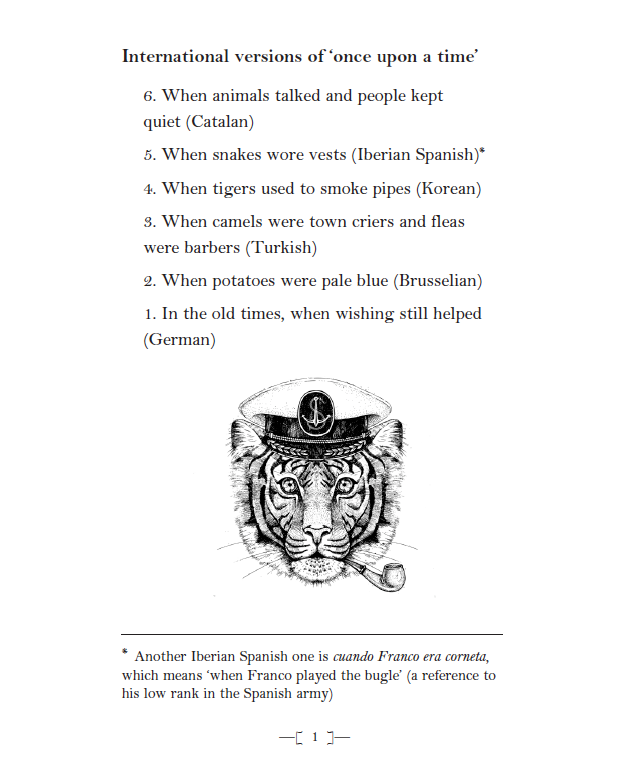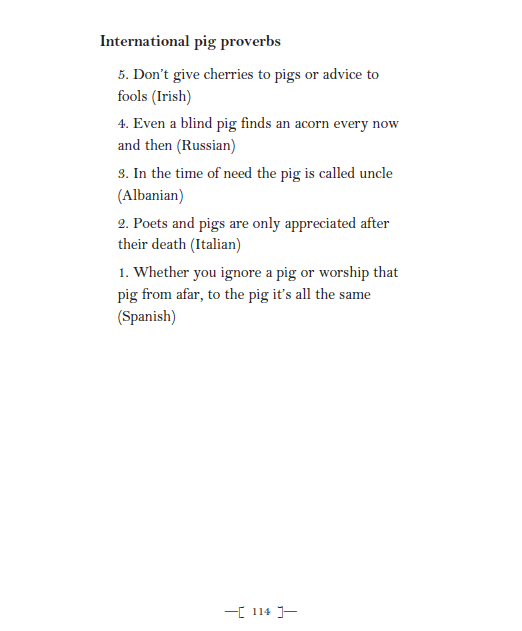A Spanish version of “in a while, crocodile” is me las piro, vampiro. It means “I’m outta here, vampire”
* read on for lots more rhyming farewells from around the world (a thread)…
* read on for lots more rhyming farewells from around the world (a thread)…
In Chile, when a gathering is over and it’s time to leave you can say calabaza, calabaza, cada uno pa su casa. It means “pumpkin, pumpkin, everyone to their own home”
Two more Spanish versions of “see you later, alligator” are hasta la vista, ciclista (“see you later, cyclist”) and con esto y un bizcocho, hasta mañana a las ocho (“with this and a slice of pound cake, see you tomorrow at eight o’clock”)
Some other Spanish rhyming farewells are adiós, carita de arroz (“cheerio, rice face”); hasta luego, cara huevo (“see you later, egg face”); and hasta luego, noruego (“see you later, Norwegian”)
Speaking of Norwegians, a rhymey bye in Norway is hade på badet, din gamle sjokolade. It means “goodbye on the toilet, you old chocolate”
And you can reply with ser deg i kveld, din gamle karamell. That means “see you tonight, you old caramel”
And you can reply with ser deg i kveld, din gamle karamell. That means “see you tonight, you old caramel”
A rhyming greeting in Norwegian is hallo på do, din gamle sko, which means “hello, you old shoe”
Another one is halla balla. It means “hello balls” (as in testicles)
Another one is halla balla. It means “hello balls” (as in testicles)
A Polish rhyme for saying goodbye (more of a “get lost” really) is mam cię w dupie, kościotrupie. It means “I don’t give a shit about you, skeleton”
A Romanian rhymey farewell is la revedere și un praz verde, which means “goodbye and a green leek”
Another food-related cheerio, from Basque, is agur yogur. It means “bye yoghurt”
Another food-related cheerio, from Basque, is agur yogur. It means “bye yoghurt”
Also from Basque, there’s a call-reply pair of phrases (similar to how in English “see you later, alligator” is followed by “in a while, crocodile”) that goes as follows…
Agur, Ben Hur (“goodbye, Ben Hur”)
Gero arte, Bonaparte (“see you later, Bonaparte”)
Agur, Ben Hur (“goodbye, Ben Hur”)
Gero arte, Bonaparte (“see you later, Bonaparte”)
And in Montreal in the 1970s, the exchange of “see you later, alligator” and “in a while, crocodile” was sometimes concluded with a third part... “hang loose, pamplemousse”
A farewell from Japanese, taken from the children’s superhero picture book series Anpanman, is bai baikin (ばいばいきん). It means “bye bye, microbe”
A fun Finnish farewell is moro, sano poro, which means “goodbye, said the reindeer”
Another similar one is eiku menoks, sanoi Annie Lennox. It means “let’s go, said Annie Lennox”
Another similar one is eiku menoks, sanoi Annie Lennox. It means “let’s go, said Annie Lennox”
If you want a rhymey bye for when you’re saying farewell to a group of people, there’s the Italian ciao a tutti, belli e brutti. It means “goodbye everyone, the pretty ones and the ugly ones”
And if you want a rhymey bye for when you’re leaving for the weekend, you can use the Brazilian phrase beijos na bunda, até segunda. It means “kisses on your butt, see you Monday”
If you want a rhyme for saying goodnight, here are a couple from Finnish (courtesy of @lpalokan)…
Kauniita unia, oman kullan kuvia = beautiful dreams, pictures of your own darling
Kauniita unia, kananmunia = beautiful dreams, eggs
Kauniita unia, oman kullan kuvia = beautiful dreams, pictures of your own darling
Kauniita unia, kananmunia = beautiful dreams, eggs
Speaking of goodnights, a variant of “don’t let the bedbugs bite” in Romanian is noapte buna, somn usor si vise placute, purecii sa te sarute tot din cinci in cinci minute. It means “good night, sleep tight and sweet dreams, may the fleas kiss you every five minutes”
More international rhymey byes…
5. Aju paraplu (Dutch) = adieu umbrella
4. Bless fress (Icelandic) = goodbye tomcat
3. Čauky mňauky (Czech) = ciao meow
2. Szervusz vízibusz (Hungarian) = cheerio waterbus
1. Tack och hej, leverpastej (Swedish) = thank you and goodbye, liver paté
5. Aju paraplu (Dutch) = adieu umbrella
4. Bless fress (Icelandic) = goodbye tomcat
3. Čauky mňauky (Czech) = ciao meow
2. Szervusz vízibusz (Hungarian) = cheerio waterbus
1. Tack och hej, leverpastej (Swedish) = thank you and goodbye, liver paté
Another great Swedish phrase (though not rhymey, or a goodbye) is allt löser sig med våld o vaselin. It means “you can solve everything with violence and Vaseline”
A mini list of French rhymey byes about public transport…
3. À plus dans le bus = see you later on the bus
2. À demain dans le train = see you tomorrow on the train
1. À bientôt dans le métro = see you soon on the subway
3. À plus dans le bus = see you later on the bus
2. À demain dans le train = see you tomorrow on the train
1. À bientôt dans le métro = see you soon on the subway
Another colloquial French way of saying let’s get out of here is roule, ma poule. It means “let’s roll, hen”
And before I wrap up and say ciao meow (for now), let me again say that I have a whole book of nonsense like this (out today!). It’s called THE WHEEL IS SPINNING BUT THE HAMSTER IS DEAD: A JOURNEY AROUND THE WORLD IN IDIOMS, PROVERBS AND GENERAL NONSENSE (order link in my bio)




• • •
Missing some Tweet in this thread? You can try to
force a refresh

 Read on Twitter
Read on Twitter




